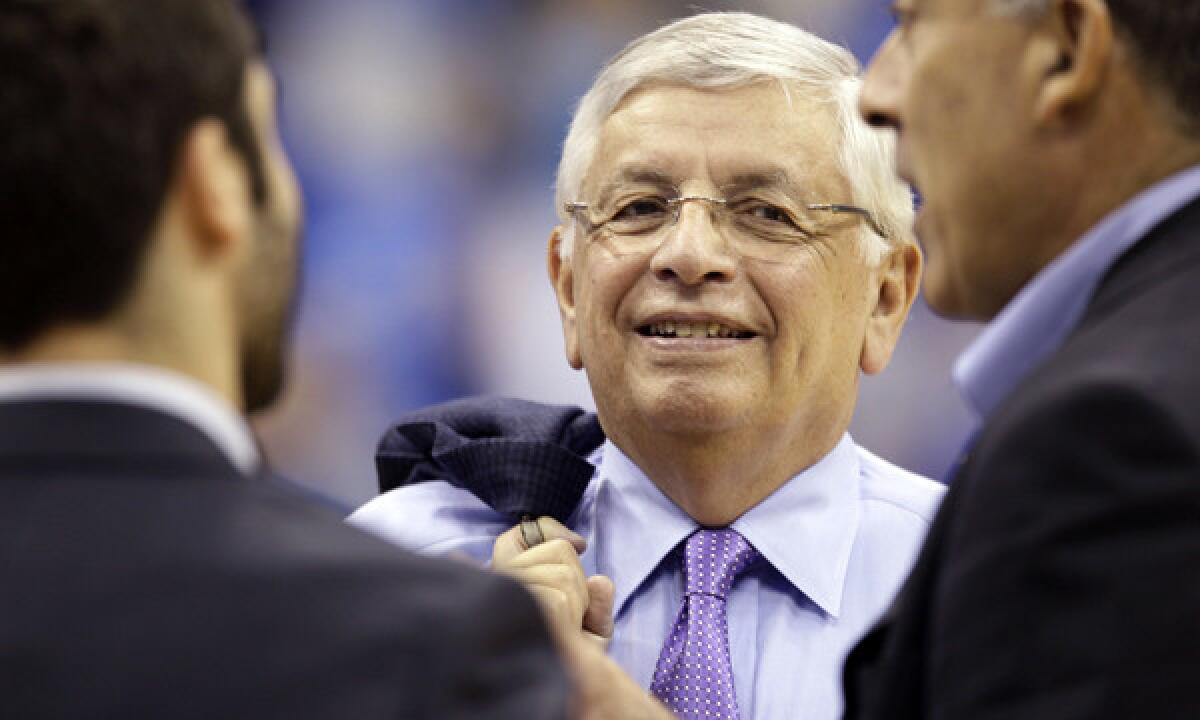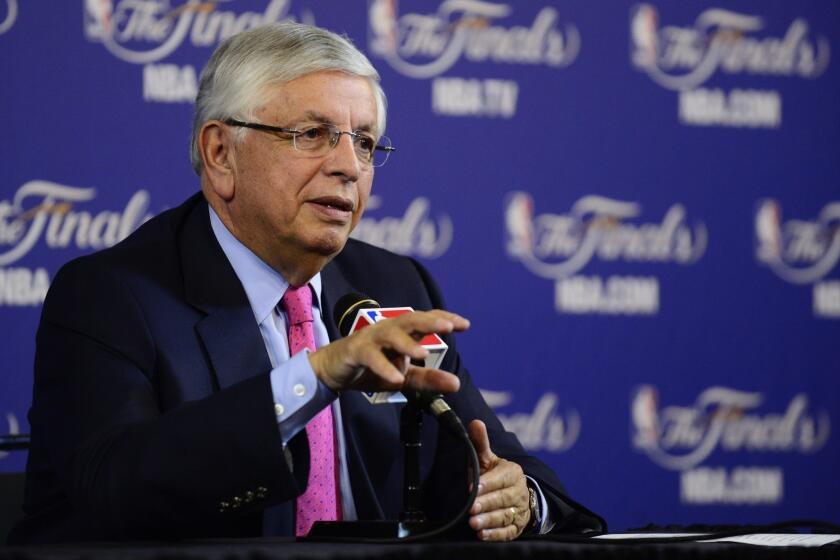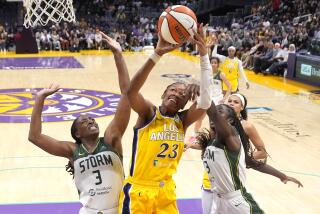David Stern, NBA commissioner who oversaw global growth, dies at 77

- Share via
David Stern, the longtime NBA commissioner who shepherded the NBA from the edges of disaster to unimaginable success, died Wednesday. He was 77.
Stern died as the result of a brain hemorrhage he suffered Dec. 12 in New York, according to a statement released by the league.
For 30 years, Stern oversaw the NBA as it grew into a viable domestic and global product. Under his leadership, the NBA added seven franchises to expand to 30 teams. He negotiated big-money television deals, organized the league offices to include 13 around the world, handled multiple crises and work stoppages, and put a focus on marketing and international exposure.
“He was a mentor and one of my dearest friends,” said Adam Silver, who took over as NBA commissioner for Stern on Feb. 1, 2014, after having worked alongside him for 22 years. “We spent countless hours in the office, at arenas and on planes wherever the game would take us. Like every NBA legend, David had extraordinary talents, but with him it was always about the fundamentals — preparation, attention to detail, and hard work.”
Born Sept. 22, 1942, in New York City to the owner of a delicatessen, Stern’s work with the NBA began at the very beginning of his professional career. After graduating from law school and passing the New York bar exam, he worked on the lawsuit that established free agency during the NBA-ABA merger.
From Michael Jordan to Shaq, from Bill Russell to Magic as well as sports commissioners, they react to the death of former NBA Commissioner David Stern.
In 1978, Stern was hired as the NBA’s general counsel and soon was promoted to executive vice president. Working under then-Commissioner Larry O’Brien, Stern and the NBA implemented a salary cap and strict drug-testing policies. He replaced O’Brien in 1984.
“David had to fight every step along the way for respect for the NBA,” Silver told Sports Illustrated in 2018. “I inherited a very different situation. A transcendent league, one that was clearly still on the ascent. The charge for me was: Don’t screw it up. David was faced with an entirely different set of circumstances.”
In 1980, the NBA Finals deciding game was shown on tape delay. Teams were losing money. Contraction was a real possibility.
Though some events were in motion that were out of Stern’s control (Larry Bird and Magic Johnson had already begun playing in the NBA and Michael Jordan was about to be drafted), Stern had an unquestioned effect on the NBA’s trajectory.
“Without David Stern, the NBA would not be what it is today,” Jordan said in a statement. “He guided the league through turbulent times and grew the league into an international phenomenon, creating opportunities that few could have imagined before.
“David had a deep love for the game of basketball and demanded excellence from those around him — and I admired him for that. I wouldn’t be where I am without him.”
Under Stern, the NBA began sending a team to Europe for exhibition games. The league played regular-season games in Japan and angled for a foothold in China. And, perhaps most important, Stern worked with USA Basketball to allow professional players to participate in the 1992 Olympics — creating the Dream Team, which included Jordan, Johnson, Bird, Charles Barkley and Patrick Ewing, among others. He also oversaw the creation of the WNBA and the NBA’s developmental league.
“His steadfast commitment to women’s sports was ahead of its time and has provided countless opportunities for women and young girls to aspire to play basketball,” WNBA Commissioner Cathy Engelbert said in a statement.
In a statement released by the NFL, Commissioner Roger Goodell called Stern “the dean of commissioners, not only for his longevity and his vision for the NBA, but for his willingness to offer advice when I first started as NFL commissioner.”
Lakers star LeBron James called Stern “a great visionary” for the sport.
“I think him and Dr. James Naismith are two of the most important people for the game of basketball,” James said Wednesday. “Obviously, Dr. Naismith because he created the game and then David, his vision to make this game global. I don’t know how many people believed in that with him or thought it was something that couldn’t be done. But he made this game global.”
The growth of the game was predicated on Stern’s belief in the NBA’s place as an entertainment option, not just a sports league.
“David came in and looked at the NBA and saw it as something more than just sports,” Isiah Thomas, then the president of the NBA Players Assn., said to Sports Illustrated in 1991. “It’s really just entertainment. It’s a Michael Jackson tour, a Rolling Stones tour. He saw it as an NBA tour.”
In the same profile, Stern compared the league to an iconic American entertainment company — Disney.
“They have theme parks and we have theme parks. Only we call them arenas. They have characters: Mickey Mouse, Goofy. Our characters are named Magic and Michael,” Stern said. “Disney sells apparel; we sell apparel. They make home videos; we make home videos.”
When he took the job in 1984, the NBA’s 23 teams were worth $400 million. When Stern stepped down in 2014, the league’s 30 franchises were worth an estimated $19 billion.
“He was a man of great vision and energy who is responsible for the operational and business advancements that created the modern sports industry,” said NHL Commissioner Gary Bettman, a longtime friend of Stern. “David taught me how to be a commissioner and, more importantly, how to try to be a good person.”
Said former Lakers coach and Miami Heat executive Pat Riley, “David Stern was the best professional sports commissioner ever. What David did for the game of basketball was unparalleled. Everyone involved in the game during his tenure benefitted in a massive way. I personally was one of them.”
Those who knew him or worked with him also trusted Stern.
“He was always somebody, as a matter of fact, my father, Dr. Buss, told me if I ever needed guidance or advice or counsel to call David, Lakers co-owner Jeanie Buss said. “That I could trust him and rely on him. And he was always there for me.
“David was a great leader, a strategic thinker. He was committed to growing the NBA into a powerhouse global brand, which he did.”
Stern also was, intentionally or not, a de facto activist in the fight to better inform the public about HIV and AIDS. After Magic Johnson was diagnosed with HIV, Stern spoke with the league’s owners to persuade them that Johnson should play in the 1992 All-Star game. He sent doctors to every team to separate myth from fact about the disease.
When Johnson was selected the game’s most valuable player, Stern hugged him at center court.
Stern was inducted into the Naismith Memorial Basketball Hall of Fame in 2014.
His tenure wasn’t without controversy. The NBA lost games to lockouts in 1998 and 2011. His dress code policy in 2005 was wildly unpopular at the time. Allen Iverson said: “I don’t think it’s good for the league. It kind of makes it fake.”
There were gambling scandals involving an official and a failed new basketball rollout that led to the league quickly reversing course. Players on the Detroit Pistons and Indiana Pacers had a fight that spilled into the crowd, forcing Stern to issue significant suspensions.
In Los Angeles, Stern outraged many Lakers fans for vetoing a trade between the Lakers and New Orleans Hornets that would have sent Chris Paul to play alongside Kobe Bryant. Stern had the power to do so because the NBA was acting as controller of the New Orleans’ franchise at the time. Paul was then traded to the Clippers.
After stepping down, Stern became involved with several start-up companies with tangential relationships to basketball, like wearable medical technologies.
“When I think back on the best stuff, I’m not thinking about Michael [Jordan] hitting all the threes or the last shot,” Stern told Sports Illustrated in 2018. “I think about Magic announcing he was HIV positive, and Latrell Sprewell deciding to choke P.J. Carlesimo, Ron Artest going into the stands, [former referee Tim] Donaghy betting on games.
“Those were places I had to step up and protect the league and that comes with the job. That wasn’t extra stress. That was the job.”
Stern is survived by his wife, Dianne, and two sons, Eric and Andrew.
More to Read
Start your day right
Sign up for Essential California for the L.A. Times biggest news, features and recommendations in your inbox six days a week.
You may occasionally receive promotional content from the Los Angeles Times.








